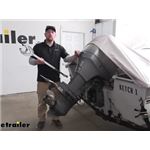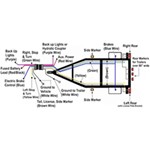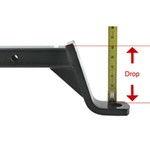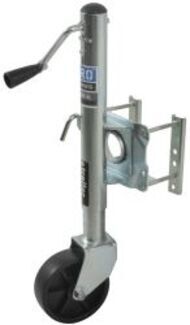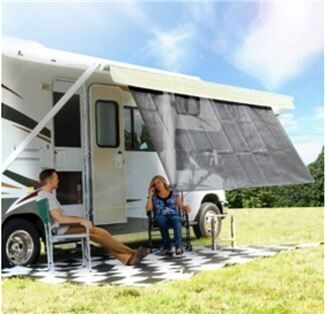Filter by Anchor Type
-
Anchor Rode

$236.44 - $528.77
Fluke Anchor
$75.27 - $757.99
Plow Anchor
$187.96 - $563.52

on Boat Anchor
Videos
for Boat Anchor
Help Articles
for Boat Anchor
Expert Answers
for Boat Anchor
Thank you for the photo! It looks like you've got the Lionshead Liger wheel currently, which we do carry. With that said, we don't have a pre-matched combo available with this wheel, but can give you the part number for a new wheel and tire…
view full answer...Hello Jordan, thanks for reaching out. Sounds like you are on the right track. The correct replacement fat tire holders for your Swagman E-Spec #S94FR are the following: - Replacement Wheel Holder for Swagman G10 or E-Spec Bike Rack - Right Side…
view full answer...I spoke with my contact over at Brophy about stainless steel hitch ball #SC23-C and found out that the included nut and washer are not stainless steel but do have a zinc plating. This is common for stainless steel balls. The hardware used to secure…
view full answer...You could pretty easily install the springs you have but you will need to use a single axle trailer hanger kit like part #APS4 as the bushing sizes and hangers you have now won't work with the spring you have part #SP-113275.
view full answer...For your 2008 Keystone Cougar 311RLS, I recommend the Lippert Components Universal Mount Power Landing Gear Kit - 6,000 lbs #LC333964 if you want to replace your landing gear with an almost identical system. I recommend replacing the entire system…
view full answer...Thanks for the pictures! Based on the weight of your 2008 Keystone Cougar 5th Wheel, you will want the item #LG-1 landing gear set. You are going to want to measure to be sure this is the right size for you. The two things you will want to measure…
view full answer...For your tongue weight, you are right about the Gen-Y Glyder like #325-GH-12001 not being the best option as that requires a tongue weight of at least 400 lbs to reap the benefits. So for your tongue weight below that, I recommend the RockerBall for…
view full answer...It sounds like the remains of a double lip seal. Was it like a rubber o-ring with a metal spring around it? You are going to have to replace the seal so I would just disregard the sleeve. It would go on the outside of the rubber lip though. I…
view full answer...Triple-lip grease seals have been around for a while, and you're not going to notice a benefit with them over the double-lipped Grease Seals #RG06-050. We do not have triple lip seals, and they're honestly just not necessary.
view full answer...Yes, the Timken Bearing Kit #TMK52VR will fit your 3,500 lb axle as it fits an standard #84 spindle. The only time this kit won't fit with a 3,500 lb axle is if the trailer/axle is made before the 2000's since that's about the time that…
view full answer...I looked at some pictures of the 2015 Featherlite Trailer and it appears to use a standard entry door lock like the Global Link #295-000019. This particular latch kit is designed to perfectly replace Bauer, Lippert, Fastec, and TriMark entry door…
view full answer...There is no exact way to determine the leaf spring length. The best way to determine the length for a replacement is by measuring the existing leaf springs. The hanger distance and shackle length can help you get a good idea, but you're looking…
view full answer...
on Boat Anchor
Videos
for Boat Anchor
Help Articles
for Boat Anchor
Expert Answers
for Boat Anchor
Thank you for the photo! It looks like you've got the Lionshead Liger wheel currently, which we do carry. With that said, we don't have a pre-matched combo available with this wheel, but can give you the part number for a new wheel and tire…
view full answer...Hello Jordan, thanks for reaching out. Sounds like you are on the right track. The correct replacement fat tire holders for your Swagman E-Spec #S94FR are the following: - Replacement Wheel Holder for Swagman G10 or E-Spec Bike Rack - Right Side…
view full answer...I spoke with my contact over at Brophy about stainless steel hitch ball #SC23-C and found out that the included nut and washer are not stainless steel but do have a zinc plating. This is common for stainless steel balls. The hardware used to secure…
view full answer...You could pretty easily install the springs you have but you will need to use a single axle trailer hanger kit like part #APS4 as the bushing sizes and hangers you have now won't work with the spring you have part #SP-113275.
view full answer...For your 2008 Keystone Cougar 311RLS, I recommend the Lippert Components Universal Mount Power Landing Gear Kit - 6,000 lbs #LC333964 if you want to replace your landing gear with an almost identical system. I recommend replacing the entire system…
view full answer...Thanks for the pictures! Based on the weight of your 2008 Keystone Cougar 5th Wheel, you will want the item #LG-1 landing gear set. You are going to want to measure to be sure this is the right size for you. The two things you will want to measure…
view full answer...For your tongue weight, you are right about the Gen-Y Glyder like #325-GH-12001 not being the best option as that requires a tongue weight of at least 400 lbs to reap the benefits. So for your tongue weight below that, I recommend the RockerBall for…
view full answer...It sounds like the remains of a double lip seal. Was it like a rubber o-ring with a metal spring around it? You are going to have to replace the seal so I would just disregard the sleeve. It would go on the outside of the rubber lip though. I…
view full answer...Triple-lip grease seals have been around for a while, and you're not going to notice a benefit with them over the double-lipped Grease Seals #RG06-050. We do not have triple lip seals, and they're honestly just not necessary.
view full answer...Yes, the Timken Bearing Kit #TMK52VR will fit your 3,500 lb axle as it fits an standard #84 spindle. The only time this kit won't fit with a 3,500 lb axle is if the trailer/axle is made before the 2000's since that's about the time that…
view full answer...I looked at some pictures of the 2015 Featherlite Trailer and it appears to use a standard entry door lock like the Global Link #295-000019. This particular latch kit is designed to perfectly replace Bauer, Lippert, Fastec, and TriMark entry door…
view full answer...There is no exact way to determine the leaf spring length. The best way to determine the length for a replacement is by measuring the existing leaf springs. The hanger distance and shackle length can help you get a good idea, but you're looking…
view full answer...Filters
- 27 results
Filter Results
-
 Anchor Rode
Anchor Rode
$236.44 - $528.77
-
 Fluke Anchor
Fluke Anchor
$75.27 - $757.99
-
 Plow Anchor
Plow Anchor
$187.96 - $563.52
Boat Anchor Parts or Accessories


 Filters
Filters





